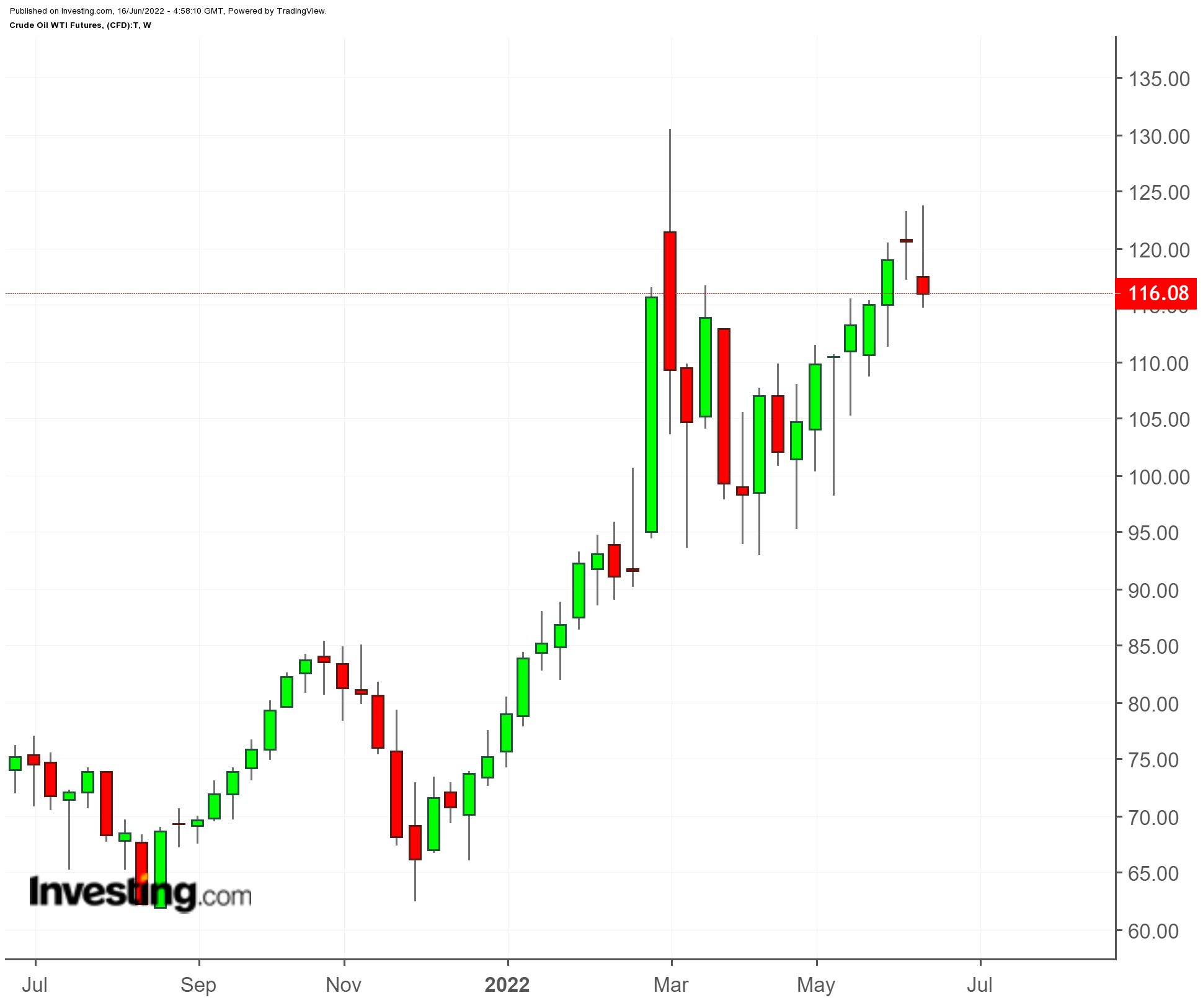President Biden plans to travel to Saudi Arabia in July. Everyone believes this visit is really about oil even though the White House insists the purpose will be to discuss security issues and specifically not energy issues.
However, no one is buying that line since the White House has made it clear that lower gas prices are a priority. Indeed, Washington has already tried to pressure Riyadh to raise oil production.

When oil prices first started to rise during the fall of 2021, the Biden administration repeatedly called for Saudi Arabia and OPEC to increase production. But, OPEC refused to elevate its output quotas by more than the modest 400,000 bpd per month.
When prices reached triple digits after the Russian action in Ukraine began, President Biden personally called King Salman, but the Saudis still refused to authorize any boost above their OPEC+ quotas.
So, it seems logical that oil prices will be a major topic at the July meeting.
Now that the average price of a gallon of gasoline in the United States is just over $5, the Biden administration is desperately trying to find something it can do to bring gasoline, diesel, and other energy prices down for American consumers.
The administration’s plan to release 1 million barrels of crude oil per day for six months from the nation’s strategic petroleum reserve (SPR) has yet to make even a minor dent in oil prices.
Could an in-person request from the American president to the Saudi leadership convince the Saudis to increase oil production? In that event, how much oil could we expect will be added to the market, and would that make a difference to oil and gasoline prices in the U.S.?
Increased Saudi Production Likely Would Not Negate OPEC+ Underproduction
In May, the total amount of oil produced by OPEC+, if all members were producing at the maximum rate allowed by their quotas, would have been 40.371 million bpd. (This does not include Iran, Venezuela, and Libya, which are exempt from quotas).
But OPEC+ did not produce as much as its quotas allowed. It only produced 37.6 million bpd of oil, a shortfall of 2.616 million bpd, according to S&P Global Platts. Saudi Arabia produced 10.45 million bpd in May, which is 99,000 bpd below its quota.
Even if Saudi Arabia increased its production by 1 million bpd (which we know it can do), that increased Saudi outlay still would not make up for the shortfall from other OPEC+ members.
Can Saudi Arabia Actually Increase Production?
Aramco (TADAWUL:2222) can increase its oil production to a rate of 12 million bpd and maintain that level for one year, if instructed by the Saudi government.
This is known as Aramco’s MSC, or Maximum Sustained Capacity, and Aramco must be ready to achieve its MSC (currently 12 million bpd) by law. Aramco is now working to increase its MSC to 13 million bpd, but that will not be achieved for several more years.
In April of 2020, Aramco produced 12 million bpd, although it did not maintain that rate for even two months.
The question is not whether Saudi Arabia has the ability to produce more oil (it does) but whether it wants to produce more oil. Hitting the 12 million bpd mark can put stress on Saudi Arabia’s oil fields and puts the country at a strategic disadvantage as it negates its usual spare capacity, so there needs to be a good enough reason to increase production as high as its MSC.
Would More Saudi Oil Make A Difference?
It is unlikely that Saudi Arabia sees the current situation as a worthy reason to increase production up to its MSC, but even if it did, this would only add 1.55 million bpd of oil to the market.
If Saudi Arabia chose to increase its production to 11.6 million bpd, which is the current rate of production in the U.S., that would add a little over 1 million bpd to the market.
The current EIA estimate shows that global oil supply and demand are essentially matched right now (about 100 million bpd each). With supply and demand basically in equilibrium, any disruption to the market—like sanctions on Russian oil—will cause prices to rise because there is no oil from elsewhere to compensate.
Since over 1 million bpd of oil from Russia is being disrupted, an additional 1 million bpd or 1.5 million bpd of Saudi oil is unlikely to be enough to bring prices down in a significant way.
The Geopolitics Of It All
The Biden administration tried to demonstrate a tough stance against the Saudi monarchy early on, which contrasted starkly with the Trump administration’s close connections with Saudi leadership at most times.
Now, the White House is going to Saudi Arabia seemingly desperate for help. The first time it was rumored that Biden might travel to Saudi Arabia, a couple of weeks ago, the possibility of the trip was denied.
Look for the Saudis to drive a hard bargain versus Biden. If Saudi Arabia does increase production to help Biden politically, it will expect something significant in return.
However, that something may not be announced right away. Still, we can be sure it will come if a deal is done.
Traders have an additional array of fundamental reasons to keep prices elevated including refinery limitations in the U.S., hesitancy in the U.S. oil and gas industry and its financiers, negative sentiment tied to Russia, inflation, and pure speculation.
Therefore, it seems likely that even if the Biden White House were able to get the Saudis to raise oil production in exchange for some favor, consumers would only see minor relief when it comes to gasoline prices.
Saudi Arabia is not the answer to Biden’s political problems. For that, he needs to look closer to home.
